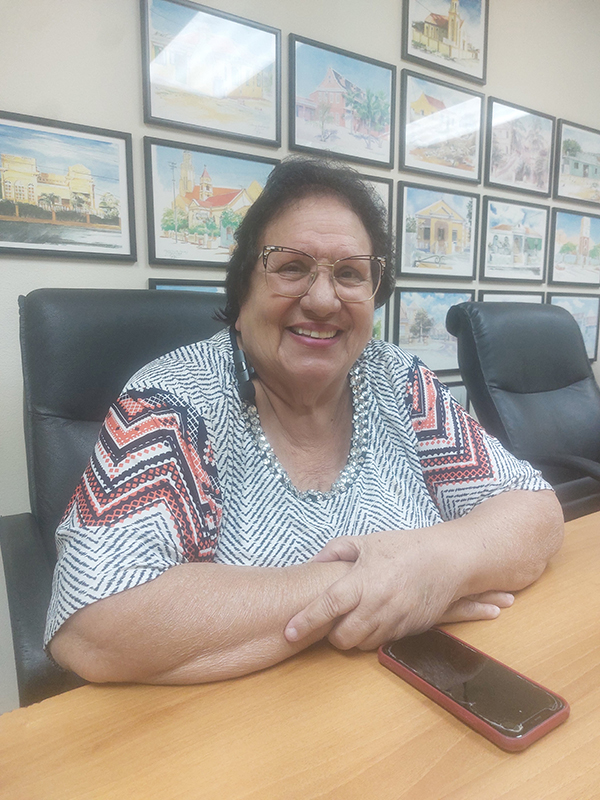ORANJESTAD – The Foundation for Aruban Carnival, SAC for its initials in Dutch, was the founding organization for Aruba’s Carnival as a national celebration. Behind this powerful organization is Tecla Hernandez-Kelly, a backbone of Aruba’s Carnival history.
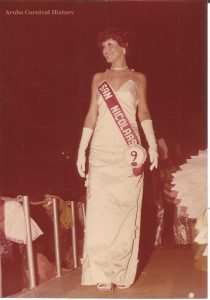
SAC was founded on the 11th of November 1966 at 11:11am. They put together the program of all activities and make sure that all events are carried out perfectly. They also had to make sure that the parades started and ended on time and that they were carried out safely and without major incidents, working together with the police, Red Cross and other organizations and groups. At the end of Carnival season, SAC would hand out awards for the best groups and best costumes and road pieces.
We had a conversation with the president of SAC on occasion of the 70th edition of Aruba’s Carnival. Hernandez-Kelly told us about her trajectory as a member and president of SAC, her point of view regarding changes related to Carnival, and the direction she sees Carnival taking for the future.
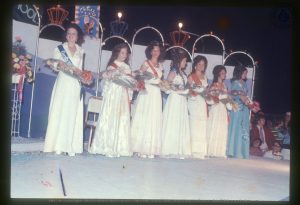
Tecla began her work as volunteer in SAC when she was very young, helping out when she was only 22 years old by searching for candidates for Carnival Queen for the district of Oranjestad. She was heavily involved in the youth activities for Carnival up until around the 80s. During these years, she got the opportunity to enter the group that organized the grand parades, something that she wanted because in this group she could better voice her opinions and ideas.
She says that in the beginning she started as an assistant for the late Milo Croes, former president of SAC. In 2003, Mr. Croes took his retirement as president of SAC, and during the election for a new president, Tecla won and she began her role as a president for the foundation organizing Carnival.
She commented that despite the fact that currently another organization, namely SMAC is in charge of Carnival, SAC is still there. She says that once already SAC was asked to organize Carnival once again, but the minister in charge back then rejected this idea.
In 2014, SAC fought to continue with their task, but in the end, SAC was destitute as the foundation organizing Carnival, and SMAC was founded and took up this role.
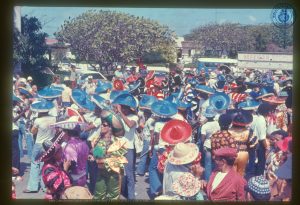
“I continued from 2003 until 2014, I served as president of SAC, and in a way up until today, and for as long as SAC is there I will be there. And if I have to leave, then I have to leave, because not even I can stay forever,” she pointed out.
She explained that the change from SAC to SMAC came because many thought that SAC had a lot of money, but the reality was that SAC had no money. She explained that the money that SAC received was from sponsors and was invested back into Carnival.
Tecla says that in the past, compared to nowadays, it was a lot harder to get gifts and donations from businesses and entities to hand out as prizes for the winners of Carnival’s events. But at the same time, she emphasizes that she is glad to see that nowadays, businesses are more open to participating and help contribute to Carnival, be it financially or in any other way.
Calypso y Roadmarch Contest
Under SAC, Aruba used to have a Calypso and Roadmarch contest, one of the most beloved and popular events during Carnival season.
Tecla says that in 2014, late musician Antoni Gario began pressuring to change the Calypso and Roadmarch into Soca. Tecla says she was did not agree to this change, because she considers that Soca is not something Aruban.
“I used to try to explain to him that Aruba is not an island of Soca, but Aruba is an island that makes its own songs. They say Roadmarch is not a genre, but who says that we go by genre? It doesn’t go by genre, it goes because Aruba needs a song and we called it Roadmarch so that people can march with it on the road,” she explains.
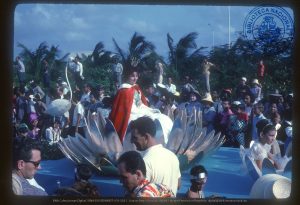
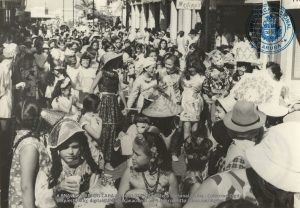
She added that as president with many years of experience organizing Carnival, she warned those who were asking for the change that on the day that they add Soca, the songs would die. “I told them you are killing them. I have nothing against any song, but the songs that we call Roadmarch from all those years… you can see that when a Roadmarch comes on, it’s for everybody. It is a song that doesn’t have a lot of difficult words and it comes with a dance,” she added.
The Caiso & Soca, sadly, is not as popular as the events prior, from when SAC was organizing it, and that long awaited change “continues damaging us.”
“They came with Caiso and Soca. Dead. That’s what you want, that’s what you get. What you see is what you get. Aruba already showed that we don’t want that. When we were with SAC, we had a Joe Laveist Ballpark completely full. You have to know what the people want. This is what Aruba likes,” she commented.
Change
Change is inevitable. Tecla says that back in Mr. Milo Croes’ time, the queens always wore white with long gloves, and would walk to compete for the crown of Carnival Queen. This practice remained for many years, until someone came with something different and everyone followed with the change.
This way, little by little change was introduced, and even though some changes were for the better, others were not. Tecla explains that while nothing bad was happening, it was fine; but as soon as something happened, some things had to be stopped and changed with the objective of improving and enhancing Carnival.
As for the future, where Tecla sees Carnival going, she emphasizes that from her point of view, a lot of hard work is needed if Aruba wants to continue celebrating Carnival.
She says that back when it was an option for her to stay, she couldn’t count with the support of the people, and now that so much has happened, there is a dark cloud on the Carnival celebrations.
“Everything was put together and it was going well. This year, see how much has happened, so much. Even though the current president, I know and I see that he tries his best, he tried but even so there are things that happen. They used to say that when they got rid of SAC all problems would be gone, but problems are never gone.”
For Tecla, the current system of having a president that only stays temporarily is a problem. Back when SAC was in charge, they received criticism because they had the same president for long periods of time, but she considers that two years is not enough for a presidency. “The Carnival this year is the last one for the current president. Next year there will be someone else who has to start from scratch, bring change for better or for worse. I don’t know. I see the presidents that passed, none of them did well. None of the four that came after me,” she concludes.


